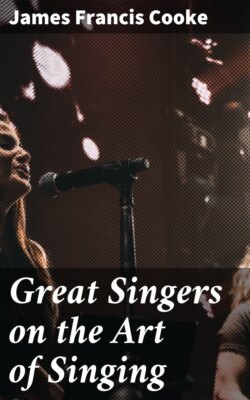Читать книгу Great Singers on the Art of Singing - James Francis Cooke - Страница 30
На сайте Литреса книга снята с продажи.
Italian Vocal Teaching
ОглавлениеSo much has been said about the Old Italian Vocal Method that the very name brings ridicule in some quarters. Nothing has been the subject for so much charlatanry. It is something that any teacher, good or bad, can claim in this country. Every Italian is of course very proud indeed of the wonderful vocal traditions of Italy, the centuries of idealism in search of better and better tone production. There are of course certain statements made by great voice teachers of other days that have been put down and may be read in almost any library in large American cities. But that these things make a vocal method that will suit all cases is too absurd to consider. The good sense of the old Italian master would hold such a plan up to ridicule. Singing is first of all an art, and an art can not be circumscribed by any set of rules or principles.
The artist must, first of all, know a very great deal about all possible phases of the technic of his art and must then adjust himself to the particular problem before him. Therefore we might say that the Italian method was a method and then again that it was no method. As a matter of fact it is thousands of methods—one for each case or vocal problem. For instance, if I were to sing by the same means that Mr. Caruso employs it would not at all be the best thing for my voice, yet for Mr. Caruso it is without question the very best method, or his vocal quality would not be in such superb condition after constant years of use. He is the proof of his own method.
I should say that the Italian vocal teacher teaches, first of all, with his ears. He listens with the greatest possible intensity to every shade of tone-color until his ideal tone reveals itself. This often requires months and months of patience. The teacher must recognize the vocal deficiencies and work to correct them. For instance, I never had to work with my high tones. They are to-day produced in the same way in which I produced them when I was a boy. Fortunately I had teachers who recognized this and let it go at that.
Possibly the worst kind of a vocal teacher is the one who has some set plan or device or theory which must be followed "willy-nilly" in order that the teacher's theories may be vindicated. With such a teacher no voice is safe. The very best natural voices have to follow some patent plan just because the teacher has been taught in one way, is inexperienced, and has not good sense enough to let nature's perfect work alone. Both of my teachers knew that my high tones were all right and the practice was directed toward the lower tones. They worked me for over ten months on scales and sustained tones until the break that came at E flat above the Bass Clef was welded from the lower tones to the upper tones so that I could sing up or down with no ugly break audible.
I was drilled at first upon the vowel "ah." I hear American vocal authorities refer to "ah" as in father. That seems to me too flat a sound, one lacking in real resonance. The vowel used in my case in Italy and in hundreds of other cases I have noted is a slightly broader vowel, such as may be found half-way between the vowel "ah" as in father, and the "aw" as in law. It is not a dull sound, yet it is not the sound of "ah" in father. Perhaps the word "doff" or the first syllable of Boston, when properly pronounced, gives the right impression.
I do not know enough of American vocal training to give an intelligent criticism, but I wonder if American vocal teachers give as much attention to special parts of the training as teachers in Italy do. I hope they do, as I consider it very necessary. Consider the matter of staccato. A good vocal staccato is really a very difficult thing—difficult when it is right; that is, when on the pitch—every time, clear, distinct, and at the same time not hard and stiff. It took me weeks to acquire the right way of singing such a passage as Un di, quando le veneri, from Traviata, but those were very profitable weeks—
Accurate attack in such a passage is by no means easy. Anyone can sing it—but how it is sung makes the real difference.
The public has very odd ideas about singing. For instance, it would be amazed to learn that Trovatore is a much more difficult rôle for me to sing and sing right than either Parsifal or Pelleas and Melisande. This largely because of the pure vocal demands and the flowing style. The Debussy opera, wonderful as it is, does not begin to make the vocal demands that such a work as Trovatore does.
When the singer once acquires proficiency, the acquisition of new rôles comes very easy indeed. The main difficulty is the daily need for drilling the voice until it has the same quality every day. It can be done only by incessant attention. Here are some of the exercises I do every day with my accompanist:
